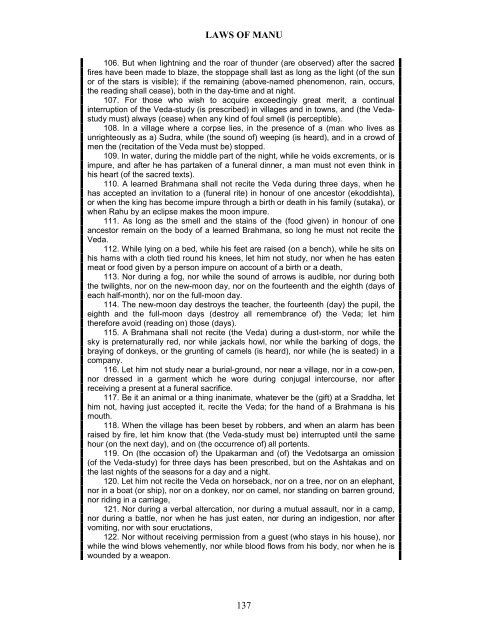You also want an ePaper? Increase the reach of your titles
YUMPU automatically turns print PDFs into web optimized ePapers that Google loves.
LAWS OF MANU<br />
106. But when lightning and the roar of thunder (are observed) after the sacred<br />
fires have been made to blaze, the stoppage shall last as long as the light (of the sun<br />
or of the stars is visible); if the remaining (above-named phenomenon, rain, occurs,<br />
the reading shall cease), both in the day-time and at night.<br />
107. For those who wish to acquire exceedingiy great merit, a continual<br />
interruption of the Veda-study (is prescribed) in villages and in towns, and (the Vedastudy<br />
must) always (cease) when any kind of foul smell (is perceptible).<br />
108. In a village where a corpse lies, in the presence of a (man who lives as<br />
unrighteously as a) Sudra, while (the sound of) weeping (is heard), and in a crowd of<br />
men the (recitation of the Veda must be) stopped.<br />
109. In water, during the middle part of the night, while he voids excrements, or is<br />
impure, and after he has partaken of a funeral dinner, a man must not even think in<br />
his heart (of the sacred texts).<br />
110. A learned Brahmana shall not recite the Veda during three days, when he<br />
has accepted an invitation to a (funeral rite) in honour of one ancestor (ekoddishta),<br />
or when the king has become impure through a birth or death in his family (sutaka), or<br />
when Rahu by an eclipse makes the moon impure.<br />
111. As long as the smell and the stains of the (food given) in honour of one<br />
ancestor remain on the body of a learned Brahmana, so long he must not recite the<br />
Veda.<br />
112. While lying on a bed, while his feet are raised (on a bench), while he sits on<br />
his hams with a cloth tied round his knees, let him not study, nor when he has eaten<br />
meat or food given by a person impure on account of a birth or a death,<br />
113. Nor during a fog, nor while the sound of arrows is audible, nor during both<br />
the twilights, nor on the new-moon day, nor on the fourteenth and the eighth (days of<br />
each half-month), nor on the full-moon day.<br />
114. The new-moon day destroys the teacher, the fourteenth (day) the pupil, the<br />
eighth and the full-moon days (destroy all remembrance of) the Veda; let him<br />
therefore avoid (reading on) those (days).<br />
115. A Brahmana shall not recite (the Veda) during a dust-storm, nor while the<br />
sky is preternaturally red, nor while jackals howl, nor while the barking of dogs, the<br />
braying of donkeys, or the grunting of camels (is heard), nor while (he is seated) in a<br />
company.<br />
116. Let him not study near a burial-ground, nor near a village, nor in a cow-pen,<br />
nor dressed in a garment which he wore during conjugal intercourse, nor after<br />
receiving a present at a funeral sacrifice.<br />
117. Be it an animal or a thing inanimate, whatever be the (gift) at a Sraddha, let<br />
him not, having just accepted it, recite the Veda; for the hand of a Brahmana is his<br />
mouth.<br />
118. When the village has been beset by robbers, and when an alarm has been<br />
raised by fire, let him know that (the Veda-study must be) interrupted until the same<br />
hour (on the next day), and on (the occurrence of) all portents.<br />
119. On (the occasion of) the Upakarman and (of) the Vedotsarga an omission<br />
(of the Veda-study) for three days has been prescribed, but on the Ashtakas and on<br />
the last nights of the seasons for a day and a night.<br />
120. Let him not recite the Veda on horseback, nor on a tree, nor on an elephant,<br />
nor in a boat (or ship), nor on a donkey, nor on camel, nor standing on barren ground,<br />
nor riding in a carriage,<br />
121. Nor during a verbal altercation, nor during a mutual assault, nor in a camp,<br />
nor during a battle, nor when he has just eaten, nor during an indigestion, nor after<br />
vomiting, nor with sour eructations,<br />
122. Nor without receiving permission from a guest (who stays in his house), nor<br />
while the wind blows vehemently, nor while blood flows from his body, nor when he is<br />
wounded by a weapon.<br />
137


















